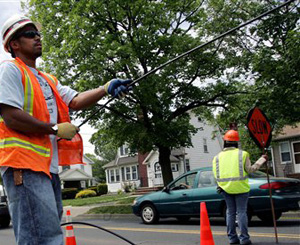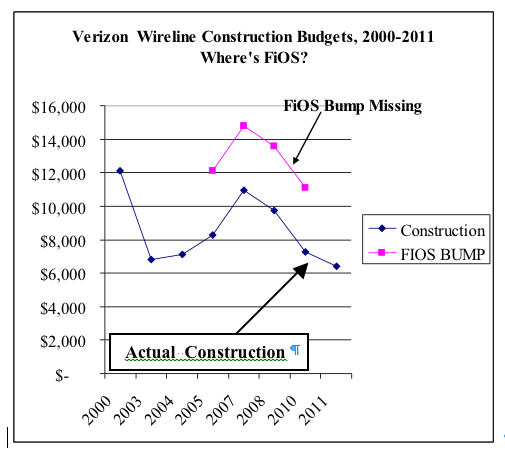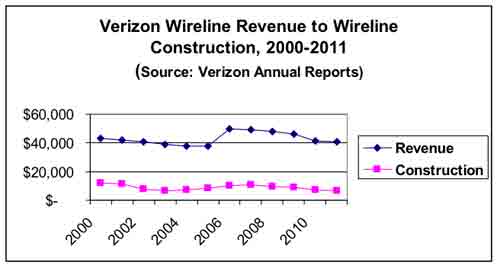
Laying cable in N.J. in 2006. (AP)
 |
The great Verizon FiOS ripoff
COMMENTARY | May 123, 2012
Verizon's decision to stop expanding FiOS, in favor of wireless, shafts millions of customers who paid billions for a network upgrade and didn't get it.
By Bruce Kushnick
bruce@newnetworks.com
(Third in a series. See part one: Please, sir, may I have another? and part two: How wireless hype is hurting America.)
After decades of demanding and getting rate hikes and tax breaks in return for promising to deliver broadband internet access to schools, libraries, hospitals and every home and business in their territories, Verizon is now making it clear that it is no longer expanding FiOS, its fiber optic cable service.
So what did they accomplish? What did they build? And how much did it cost? Verizon claims that the company spent $23 billion dollars in rolling out FiOS since 2004. (See, for instance, this message from Tim McCallion, President of Verizon’s West Region.) That's a lot of money.
But as I stare at a decade’s worth of Verizon annual reports, I notice something odd. Where, exactly, is that $23 billion? Specifically, where are the construction budgets to support this claim?
This chart shows Verizon’s construction budgets for 2000 through 2011, taken directly from the Verizon annual SEC-filed reports. It also shows an imaginary “FiOS Bump” -- about $3.8 billion dollars per year in addition to the baseline that should have been spent annually over a 6-year period if the company had really been paying out $23 billion dollars for the construction. But the numbers show no bump in construction for FiOS; no major increases in capital expenditures in general. In fact, Verizon, on average, spent more on construction from 2000 to 2004 than from 2005 to 2011.

Another way to look at it is this: Construction budgets for wireline services historically equal about 20 to 25 percent of revenues. One could reasonably expect that building out a $23 billion network over seven years would lift that percentage to well over 25 percent a year.
But it didn't happen. From 2000 to 2004, construction amounted to 22.2 percent of wireline revenues. From 2005 to 2011, it was only 19.7 percent. That's actually a $5.9 billion reduction in construction spending in those latter years, compared to what would have been spent had they just continued spending at the same ratio as during the earlier period.
This chart compares revenue and construction costs for wireline services from 2000 to 2011, in millions of dollars..

So How Did FiOS Get Built?
Whatever amount Verizon did spend on FiOS -- and obviously it was a not insignificant amount -- would therefore appear to have come out of the standard construction budgets that were supposed to be used to upgrade the lines that most Americans are still using for their phone service: the Public Switched Telephone Networks, or PSTN. It would seem that customers, including seniors, low income families, minorities, and municipalities have been funding the construction of a cable service through the hefty monthly fees they pay for a dialtone and ancillary services. In some states this is actually illegal.
If Verizon did actually spend $23 billion, then it appears to have come at the expense of the traditional maintenance and upgrades of the utility plant -- and the PSTN got totally hosed. At the very least, prices for basic phone service should have been in steep decline as one of the major costs, construction, was dramatically lowered.
Instead, Verizon was also getting rate increases specifically to pay for FiOS. For instance, Verizon persuaded New York officials to increase rates for "fiber optic investments", where the only service that could use the fiber optic service was Verizon’s FiOS.
For instance, when New York State Department of Public Service Commission Chairman Garry Brown announced the approval of a $1.95 a month rate hike for residential phone lines in 2009, he said "there are certain increases in Verizon’s costs that have to be recognized." He explained: "This is especially important given the magnitude of the company's capital investment program, including its massive deployment of fiber optics in New York. We encourage Verizon to make appropriate investments in New York, and these minor rate increases will allow those investments to continue.”
Of course the states weren't told that everyone would be charged extra for a service that only some people were going to get. In New Jersey, for instance, Verizon made a firm commitment to rewire the entire state with fiber optics – capable of 45 Mbps in both directions. It was supposed to be 100 percent completed by 2010. Instead, Verizon claims to have "passed" 1.9 million homes, representing 57% of the households in its territories -- but “passed” may or may not mean that they can actually get service.
Insult to Injury: Verizon Abandons FiOS for Wireless
What has become clear is that Verizon is going to stop deploying/upgrading the wired networks and is instead going to put its money in wireless. As a result, places that don't have FiOS now will never get higher speed services and cable competition from Verizon.
A N.J. state commission report from June 2010 saw this coming, and noted:
"While it is possible for Verizon to extend service throughout its authorized territory, to an additional 155 municipalities in the state that are not included in its current application of 369 towns, Verizon has indicated it will now concentrate its capital expenditures, expected to be between $16.8 billion and $17.2 billion in 2010 on its wireless telephone network. Further FiOS expansion will be limited to increasing penetration in those communities where FiOS is currently available, according to the company."
(The $16.8 and $17.2 billion are the companies’ total annual construction budgets, not New Jersey only.)
But as we discussed in our previous article, wireless is simply not a substitute for wireline services, especially broadband or cable service.
So, in New Jersey, one of the states I know best, here is the sequence of events: Verizon (in 1993) get changes in state law that allows them to collect billions of dollars in extra charges and tax perks in exchange for upgrading the utilities. Then, Verizon doesn't roll out the fiber optic network until 2006 -- which is a cable service, but which uses the same construction budgets that were allocated to do the utility upgrades. Then Verizon cancels FiOS, and does not upgrade the utility, leaving no upgrades of the current infrastructure in the state to compete with cable. Instead, Verizon now has its local-service customers paying for wireless upgrades, while more or less abandoning the wires and stranding millions of customers in New Jersey.
So what, at the end of the day, did all that ratepayer money actually pay for? Well, the massive excess profits were used to increase executive pay, pay for investments and losses overseas in hundreds of subsidiary companies, create massive foundations that try to buy off non-profits, and to fill war chests used for lobbying and campaign contribution. It’s clear the money didn’t go into upgrading the Public Switched Telephone Networks, where it was supposed to bring everyone a fiber optic future.
America is 15th or 33rd in the world in broadband, depending on which international or research group you believe. The failure to properly upgrade the PSTN, and the con of FiOS expenditures, has cost a large swath of America -- from Massachusetts through Virginia and the old GTE territories, such as parts of California -- a generation of technology, innovation and GDP growth.
Next: Broadband wars: The battle for New Jersey has begun. As of this writing, two small towns with service quality issues have gotten the New Jersey Board of Public Utilities (BPU) to issue a "show cause" to Verizon – claiming that they failed to meet their commitments to provide 100% of the state with 45 Mbps speeds. Verizon has just responded, claiming that they completed their obligations. Will the State actually call Verizon’s bluff or will they roll over? Will the citizens and municipalities of New Jersey join forces or will another state not get broadband justice? Or is this just a ploy to get rid of all regulations on the wires and all previous obligations?
|
|
Bruce Kushnick has been a telecom analyst for 29 years, and is currently the chairman of Teletruth, an independent customer advocacy group focusing on broadband and telecom issues, as well as executive director of New Networks Institute, a market research firm. 
E-mail: bruce@newnetworks.com
|
This article is asinine
Posted by
Justin powers
05/123/2012, 11:22 PM
I have been employed for the last 5 years laying thousands of feet of verizons cable, this man is a fool, playing off the stupidity of the general public don't believe it.
|
The above post is asinine
Posted by
Jimmy
05/124/2012, 06:46 AM
Clearly the guy above didn't even read what the article was saying. Thank you Mr. Kushnick for this truth on an extremely corrupt company.
|
Posted by
booger
05/124/2012, 09:33 AM
laying 5 years of cable to verizon wireless cell towers not for fios services.
|
Posted by
Tom B
05/124/2012, 04:47 PM
Cell towers have nothing to do with Fios an you missed the point of the article. Verizon has and will lie and fudge numbers for their bottom line,customers be damned.
|
Posted by
BrklynTech
05/124/2012, 06:51 PM
Excellent expose. The deal with Coinstar/Redbox to stream video is more of the same. The deal is on the wireline books even though VZ wants to stream it to 4G phones. I wonder were Mcadams 20 million dollar raise came from. I doubt Vodaphone wanted it coming out of their 45% of VZ wireless.
|
NY State Attny General looking at this
Posted by
communication worker
05/124/2012, 09:24 PM
Ivan Seidenberg and other top former and current executives should be called to the stand to explain this nonsense. I wouldn't be suprised if there is a "perp walk" in their future for the fraud perpetrated on the public with our own money.
|
Tech
Posted by
MIke C
05/130/2012, 08:08 AM
Ive been working for these tyrants for 15 + years and this article is spot on!!! Justin Powers is an ignorant fool. Keep up the great work PLEASE!!! Thanks Bruce
|
Ex-tech
Posted by
Don
05/135/2012, 07:17 PM
As a retiree from VZ, I have seen the games they play and the lies they spread to justify their bonuses. VZ stopped expanding several years ago. All the COs that weren't wired for FIOS then are SOL and will probably be sold off. Anyone who doesn't think so should get their head out of their butt.
|
Posted by
bruce
05/136/2012, 10:14 AM
I agree, FIOS expansion has stopped. My town is Wayne, NJ and I live just off RT202 which is a main road. The fiber optics are on the poles, all coiled up and ready to go. They have been for over 3 years and we still can not get FIOS here in town. So we are stuck with Cablevision and their overly high cable rates. But a little town like Totowa and Livingston can get FIOS service. Verizon's rates for Landlines and cell phones are way too high and need to come down. I am also a retiree from Verizon and their corporate greed must come to an end.
|
FIOS Hub Technician
Posted by
Head End
05/136/2012, 09:33 PM
I work in one of the FIOS head ends. This comment made by booger I suspect was slap stick.
"laying 5 years of cable to verizon wireless cell towers not for fios services."
What I think he is saying is: They spent large swatch of the FIOS money on building out the infrastructure starting 10 years ago knowing full well (as these technological advances are forecast out 10 years) that LTE would be the revolutionary transport technology thus eliminated stranded costs of copper on the pole, Union labor contracts and benefits,etc. It was all planned out to a T.
They have been upgrading the plant to the towers with OC48 links back to the Central Offices.. They in time will also use the old CDMA for back-haul to the CO's as well. Look up and educate yourself on this term.
Evolved Multi-media Broadband Multi-cast Services (eMBMS) Pre-loading. Then you will know what's coming.. Using the under utilized wireless network at night while your sleeping to download A La Cart programming to your wireless server and you watch it like a DVR. For live programming during the day like sports, they will do a Point to Multi-Point broadcast on part of the wireless spectrum. So imagine, A La Carte paying for only the channels you actually watch? The tower network will learn what each local tower network folks watch and cache that content close to the edge in the CO. Call it delayed FIOS tv.. Lowell put the PR out about a month ago, service coming by years end.. It's a game changer.. It is why they bought Terremark. We are already pushing the FIOS content from the Hubs to the Cloud.. Nothing will stop the train. Lobbying money has seen to that.. Sorry..
|
very weird graph axis
Posted by
John Thacker
05/151/2012, 01:50 PM
Why does the first graph axis randomly jump around in years? Consecutive entries (spaced evenly apart) are 3, 1, 1, 2, 1, 2, and 1 years apart. That doesn't make any sense.
I have to assume that you're doing that in order to mislead. Perhaps you're omitting years 2001 and 2002 because they are low, and years 2006 and 2009 because they are high, and it would look very different. If those years are included, would there be more of an obvious FIOS bump?
This seems like very irresponsible journalism, a classic case of Lying With Statistics. Bad graph.
|
Sorry "FIOS Hub Technician"
Posted by
LTParis
05/151/2012, 01:54 PM
Sorry people do not want "a la cart programming" that is downloaded at night via inferior wireless services. When you can achieve 300MB download speeds (and 65MB upload speeds) over wired, you can't hold a candle to that in the wireless space. It's not a game changer, it will likely overtax the system, and there are numerous areas that have poor cell coverage.
I miss my FIOS conenction. Living in Mo. Co. MD I enjoyed 50/5 speeds. Now I get 25/3 but the connection is far more problematic, and Time Warner's UI is horrible. FIOS is just a couple towns away from me, but I will likely never see that.
|
Dear FiOS Hub Technician
Posted by
Matt
05/151/2012, 04:21 PM
I don't want your crappy DVR caching service. I want FiOS. I had it where I used to live and it was awesome. 25 megabit up/down. It was reliable too, not once did it ever disconnect.
I don't want your worthless wireless service. I want high-speed Internet. I'll pay a premium for it. I will not, however, pay for "high-speed" wireless that is limited to 5GB of bandwidth a month.
No thanks!
|
New Networks. Institute
Posted by
Bruce Kushnick
06/153/2012, 03:08 PM
Nieman asked me to respond to this post.
>Why does the first graph axis >randomly jump around in years? >Consecutive entries (spaced >evenly apart) are 3, 1, 1, 2, >1, 2, and 1 years apart. That >doesn't make any sense.
>I have to assume that you're doing that in order to mislead. Perhaps you're omitting years 2001 and 2002 because they are low, and years 2006 and 2009 because they are high, and it would look very different. If those years are included, would there be more of an obvious FIOS bump? This seems like very irresponsible journalism, a classic case of Lying With Statistics. Bad graph.
Here's the actual data:
http://newnetworks.com/verizonconstruct2000-2011.h ...
The commenter could have simply looked up the data himself instead of accusing us of being deceptive.
The cuts in the data were because the information doesn't easily fit on a page. Moreover, for example, 2001 was not a low year and 2006 or 2009 were not especially high years. I kept the integrity of the trend line at all times.
It's clear the commenter just wanted to cast aspersions on my work and take an unjustified shot at Nieman. Next time, check the facts first.
|
deep pockets
Posted by
kracker man
06/173/2012, 09:29 PM
I hope all the trend setters have very deep pockets. The 4g lte rollout when complete will break anyone's bank who enjoy High Def content(ala high bitrate content) Data blocks aren't cheap in 4g lte land. Very good tactics in a recession huh?lol
|
Can anyone say FAP?
Posted by
eljay
06/176/2012, 04:29 PM
Head End is proud of Verizon going wireless. Crap. Wireless services all have FAP (Fair Access Policy). This is why my sister, who lives in rural Appalachia 5 miles from a town of 10,000 and can't even get cable TV, let alone internet, has no DSL option available, and has no local dialup number for any ISP has to pay $100 a month for satellite internet. This gets her 450mB of content downloaded per 24 hours (not calendar day) before they crash her speed to 14.4k and she can't even load her bank account. And it doesn't lift at the end of 24 hours, she has to "earn" it back by "good behavior". If she does anything on the internet in that next 48 hours that downloads more content than a jpg image on a webpage, her "jailtime" is longer. Great, huh? That's what we all will be having when everything goes wireless.
|
Posted by
Mike
06/180/2012, 02:31 PM
You're comparing apples to apples and apples to oranges in the same article. You constantly blur the lines of why rate hikes were approved. On the one hand you speak to the importance of improving the current plant, and then allude that Verizon is obligated to provide video competition. The specific rate hikes you cite were in place before the telecom act of 1996, which changed all the rules.
Your search for a FIOS bump assumes that major rollouts all occur together at the same time, rather than one being replaced with the next. Before FIOS was DSL, before DSL was complying with the UNE provisions of the Act of 1996 and subsequent entry into long distance.
You fail to acknowledge that a certain penetration rate must be achieved where service has been rolled out before it is cost effetive to roll out further as well.
This is a biased article whose goal is to paint a very one sided view. This is speculation based on opinion.
|
Posted by
George
07/188/2012, 03:24 PM
Stupid article. It's their service to roll out as they see fit. If they aren't making money at it, then they won't continue to invest. Where I live they installed it in the suburbs where people can afford it. Councilmen in the city (Buffalo) have been making noise because they won't install it in the in ghetto. No ****, nobody is going to buy the product there.
I love the tone of people here acting as if it is their property and their right to be served with high speed internet. I'm sure that coincides with your right to sit your fat ass in a chair all day and complain the somebody else causes you to be unhealthy
|







